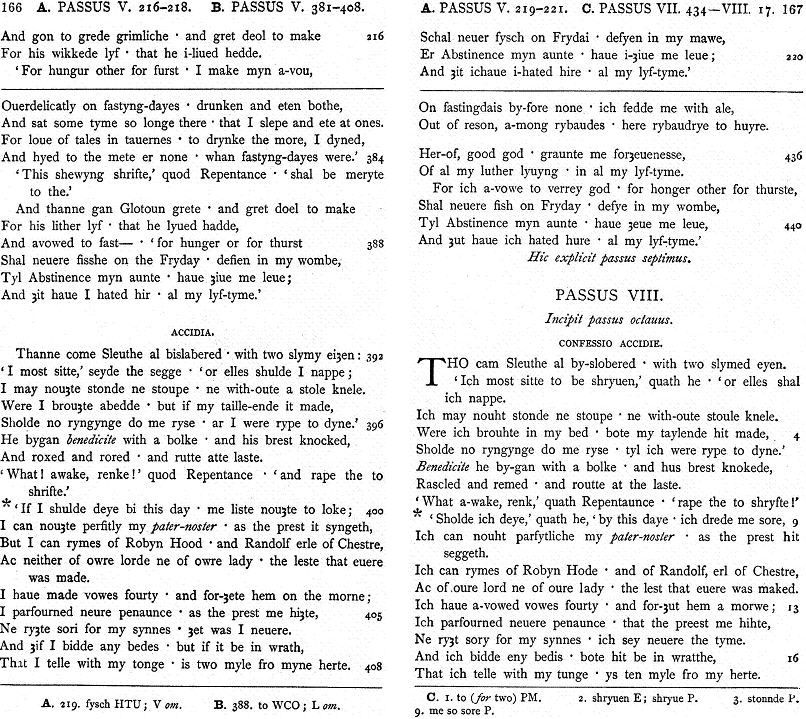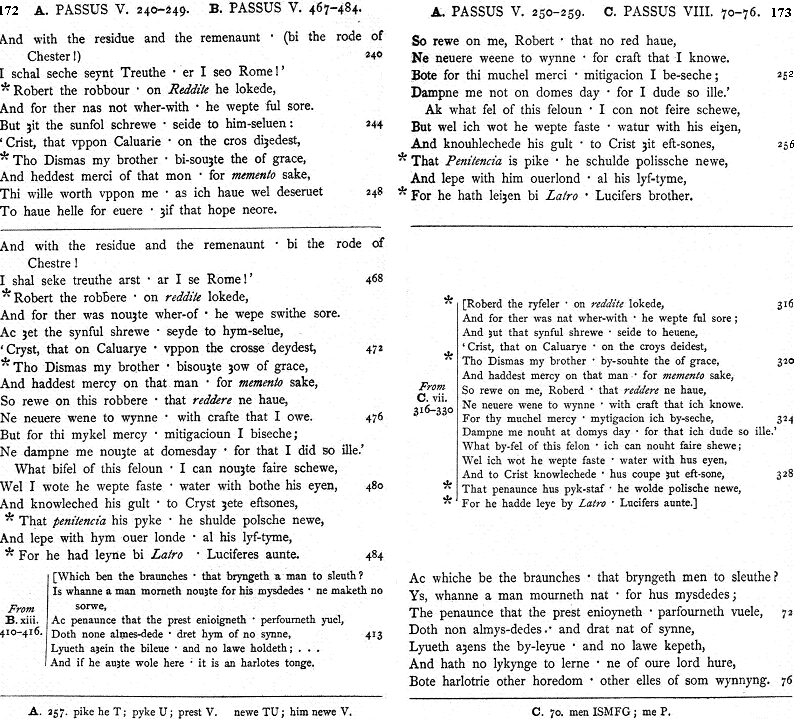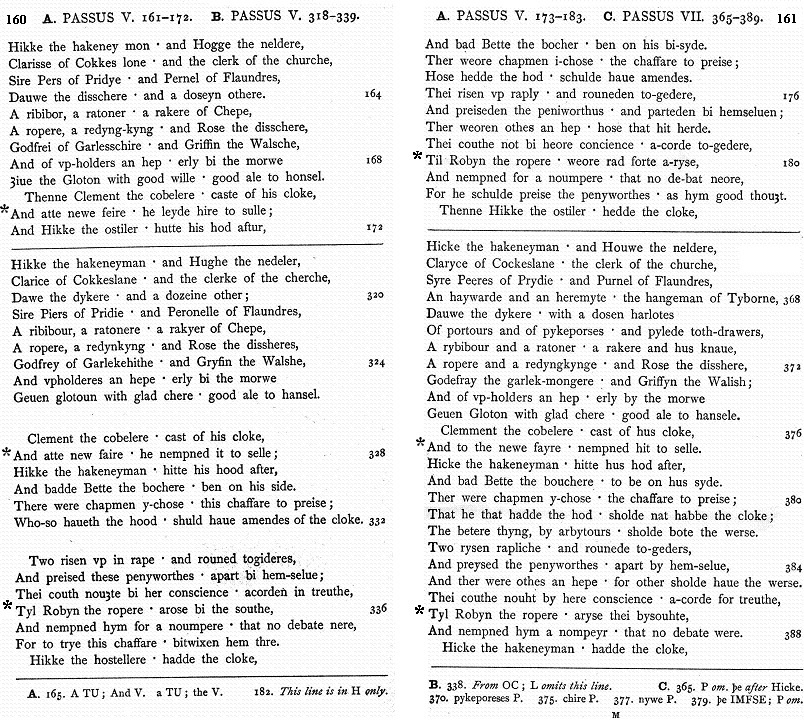Piers Plowman
For convenience, the three texts are called A, B, and C. The A text is dated to 1362-63, the B text to 1377, and the C text to about 1393.
Sloth, the drunken priest, does not know his pater-noster ( Lord’s Prayer, Matt. vi 9-13) perfectly as the priest sings it, but he knows rymes of Robyn Hood and Randolf earl of Chester. This remains the earliest certain mention of England’s most famous outlaw hero.
‘Atte nale, at the ale-house; see note to Pass. i. 43, p. 6. We here read that Sloth, who was a priest (see 1. 30) used to resort to the ale-house like the ‘Sir Piers’ mentioned in Pass. vii. 367; and even ventured to talk scandal in the church itself’. ( Skeat, vol. ii. p. 95, as per notes to C. Passus VIII).
It is unclear as to whether Langland is alluding to two separate traditions, one relating to Robin and the other to Ranulf, or is the reference to a tale or tales in which both Robin and Ranulf are present; in Passus VIII there appears to be the allusion of two separate traditions. There were three Ranulf earls of Chester: Ranulf I, 1120-1129, Ranulf II, 1129-1153, and Ranulf III,1181-1232. There is some belief that Ranulf II was the person named by Langland. The Complete Peerage tells us that he distinguished himself as a soldier, and he was in conflict with King Stephen. A more plausible candidate is Ranulf III, as he is likely to be the Earl of Chester mentioned in Sir Launfal, a Middle English lay of the late fourteenth century. There can be no doubt that Ranulf III appears in the romance of Fouke Fitz Waryn, a real outlaw who has influenced the legend of Robin Hood. Skeat mentions this Ranulf as well: ‘When this Randle was besieged by the Welsh in Rhuddlan castle, he was released by a rabble of minstrels, led by Roger Lacy (see Ritson’s Ancient songs vol. i. pp. vii, and xlvi., and Percy’s Essay on the Ancient Minstrels); and, since some privileges were conferred on the minstrels in consequence of this exploit, the least they could do in return would be to make ‘rymes’ concerning him.’ (Skeat, vol. ii. p. 95) This account appears in William Dugdale’s Baronage of England (London 1675). Another account in the same work, ascribed to an ‘old monk of Peterborough’ tells of the deposition of John and the subsequent French invasion. On the death of John the loyalists are rallied, and the invaders defeated at Lincoln; their leader, the earl of Perche, is killed by Ranulf, and the young Henry crowned king. This is possibly part of a lost romance that was in the possession of the monk of Peterborough, glorifying the earl of Chester. It is impossible to say whether either of both of these stories supplied the content of the ‘rhymes’ known to Langland.
ribaudye, ie. ribaldry, indulging in course language or vulgar jokes.
Roberde’s knaves, ie. robbers, outlaws.
Robert the robber seeks mercy from Christ, a similar theme appears in such tales as The Hermit and the Outlaw and Robert the Devil. (see Other Tales)
Reddite, probably referring to ‘Reddite ergo omnibus debita,’ (Render therefore to all their dues) in Romans 13:7. Langland was obviously familiar with the Vulgate, a Latin translation of the older bible texts, created mainly by St. Jerome between 382 and 405 CE. The saying as written in Matthew 22:21 reads: Reddite ergo, quae sunt Caesaris, Caesari et, quae sunt Dei, Deo. (Therefore give back those things that are Caesar’s to Caesar and those thing that are God’s to God.) There are several versions of this.
Ryfeler in (c) is equivalent to robbere in (b) and (a). (Skeat, Vol. ii, p. 88)
Dismas or Dimas, is the penitent thief in the apocryphal gospel of Nicodemus. See Cowper’s Apocryphal Gospels, pp. 246, 364, 426; Cov. Myst. p. 316. (Skeat, Vol. ii, p. 88)
‘That he would polish anew his pike-staff, called Penance (or Penitence (b. a);’ to which (a) and (b) add- ‘and by help of it leap over the land (ie. be a pilgrim) all his life-time.’ A pilgrim always carried a staff, generally with a spike at the end, whence it was called a pike-staff. (Skeat, Vol ii, p. 89)
Latro, must be a reference to the Latin word for a criminal, robber, or thief. Langland’s possible meaning is ‘had intercourse with theft.’ The word appears in Luke 23:33: Et postquam venerunt in locum qui vocatur Calvariæ, ibi crucifixerunt eum : et latrones, unum a dextris, et alterum a sinistris. (And when they were come to the place which is called Calvary, they crucified him there; and the robbers, one on the right hand, and the other on the left.) A similar passage appears in Matthew 27:38 and Mark 15:27. In Luke 23:39 there also appears the passage: Unus autem de his, qui pendebant, latronibus, blasphemabat eum, dicens : Si tu es Christus, salvum fac temetipsum et nos. (And one of the malefactors which were hanged railed on him, saying: If thou be Christ, save thyself and us.)
Atte new faire, at the new fair, or to the newe fayre, to the new fair. There is a reference here to an old game or custom of barter called in Teutonic law-books the Freimarkt. It seems that Hikke chose Bette to be his deputy. Then Bette and one appointed by Clement tried to make a bargain, but could not settle it till Robyn was called in as umpire, by whose decision Clement and Hikke had to abide. Hikke obtained the cloak, which was the better article and Clement was allowed to fill up his cup at Hikke’s expense (l. 390). If either drew back, he was to be fined a gallon of ale. See the article on this subject in Englische Studien, v. 150. (Skeat, Vol. ii, p. 92)
Robyn the ropere, recorded as Roper, Raper, and the rare Rapper, this is usually a surname of English origins. If so it derives from the pre 7th Century word “rap”, meaning a rope, with the suffix “-er”, meaning one who does. It was given as a medieval occupational name to a rope maker. Rope making was one of the most important skills of early times, and the requirement has continued right through to the present day. Occupational surnames were unusual in that in the 12th to 14th century they only became hereditary when a son followed his father, or possibly grandfather, into the same line of business. If the son adopted a new skill he took that as a (sur)name. Early examples of recordings taken from surviving rolls and charters include Richard le Ropere, in the Curia Regis rolls of the county of Hertfordshire in the year 1220, and Peter le Roper and Walter le Ropere who are recorded in the Hundred Rolls of landowners of Nottinghamshire and Cambridgeshire in 1273.
And Robyn the rybaudoure, probably the term is linked to ribald, ‘scoundrel,’ ‘low entertainer,’ attested from the early fourteenth century in English, and earlier in Old French (ribaud) and Latin (ribaldus).
Robert Renne-aboute shal nowte haue of myne, Robert Run-about shall not have of mine, probably in the context of condemning illegitimate beggars who take alms falsely.

|






